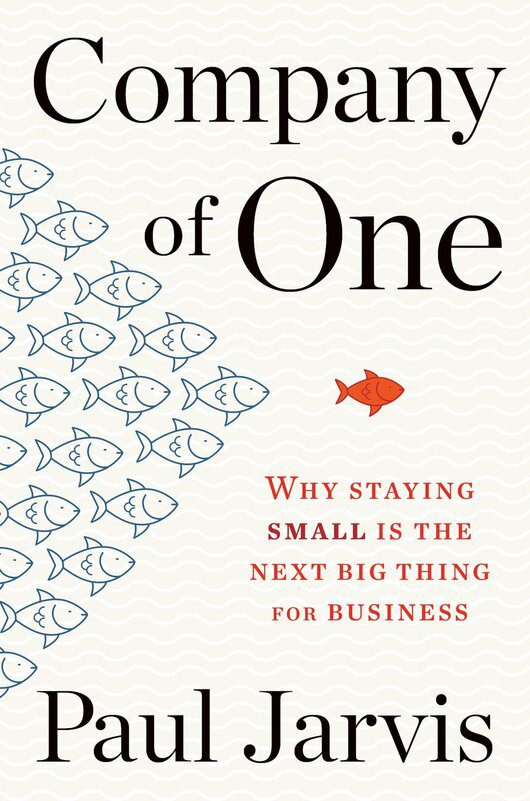A company of one resists and questions some forms of traditional growth, not on principle, but because growth isn’t always the most beneficial or financially viable move.
In Company Of One: Why Staying Small Is the Next Big Thing for Business, author and entrepreneur Paul Jarvis argues that staying small provides one with the freedom to pursue more meaningful pleasures in life―and avoid the headaches that come with traditional growth-oriented business. The core philosophy of Company of One: Start small, Define growth, and Keep learning.
A company of one is simply a business that questions growth. A company of one resists and questions some forms of traditional growth, not on principle, but because growth isn’t always the most beneficial or financially viable move. It can be a small business owner or a small group of founders. Employees, executive leaders, board members, and corporate leaders who want to work with more autonomy and self-sufficiency can adopt the principles of a company of one as well.
Staying small on purpose
Staying small doesn’t have to be a stepping-stone to something else or the result of a business failure—rather, it can be an end goal or a smart long-term strategy. The point of being a company of one is to become better in ways that don’t incur the typical setbacks of growth. You can scale up revenue, enjoyment, raving fans, focus, autonomy, and experiences while resisting the urge to blindly scale up employee payroll, expenses, and stress levels.
This approach builds both a profit buffer for your company to weather markets and a personal buffer to help you thrive even in times of hardship. The “company of one” approach doesn’t apply only to a single-person business—it’s a model for using the power of you to be more self-reliant and more responsible for your own career path. Although a company of one can certainly be a small or single-person business, it’s unlike most small businesses, whose end game is usually expansion or growth to hit peak profitability. A company of one questions growth and stays small on purpose.
A Company of One is a blueprint for growing a lean and agile business that can survive every type of eco nomic climate, and ultimately it leads to a richer and more meaningful life—no cable-cutting or moving to the woods on an island required.
The Company of One.
It’s assumed that hard work and smart thinking always result in business growth. But the opposite is often true: not all growth is beneficial, and some growth can actually reduce your resilience and your autonomy.
In truth, embracing growth appears to be the easier route more often than not, since it’s easier to throw “more” at any problem that might pop up. Want more customers? Hire more employees. Need more revenue? Spend more. Fielding more support requests? Build a bigger support team. But scaling up might not be the best or smartest solution to the basic problem.
Blind Growth
Blind growth is the main cause of business problems. It can leave you with an unmaintainable number of employees, unsustainable costs, and more work than hours in a day. It can force you to lay off employees, sell your company at a less than optimal price, or, even worse, close up shop completely.
ROWEs (Results-Only Work Environments)
Results-Only Work Environments, in which employees don’t have set schedules, all meetings are optional, and it’s entirely up to employees how they spend their time working. They can choose to work from home, they can work from 2:00 AM to 6:00 AM if it suits them, and they can sculpt their job however they want, as long as the results benefit the company as a whole.
Most companies grow for four reasons: inflation, investors, churn, and ego.
Define your Purpose
Your purpose is the lens through which you filter all your business decisions, from the tiny to the monumental. We’re talking about who you work with, what you offer, where you focus your time and energy, and even how you define your audience. Determining the unique purpose that underpins your company of one isn’t always a quick or easy process, and there’s no spreadsheet that can crunch some numbers and spit out the answer. Figuring out your purpose requires actual reflection on both your own desires and the audience you want to serve.
Defining your purpose has more to do with your personal values and ethics than with business plans or marketing strategies. You can’t fake your purpose.
The true cost of opportunities
Opportunities are just obligations wearing an appealing mask. There might be a positive outcome to seizing them, but they always come at a cost—in terms of time, attention, or resources. No matter how hard you try, you can’t scale the amount of time in your day. And since you can’t somehow buy more hours, you need to find ways to use those hours better,
You are your Business
People can copy skills, expertise, and knowledge, which are all replicable with enough time and effort. What’s not replicable is who you truly are—your style, your personality, your sense of activism, and your unique way of finding creative solutions to complicated problems. So lean on that in your work. Sell your way of thinking as much as you would a commodity. Polarization can shorten a sales cycle because it forces customers into a quicker binary choice, to decided yes or no. After all, it’s hard to make money from maybes.
Customer Happiness is the New Marketing
If your customers feel that you are taking care of them, then they’ll stick around and they’ll tell others. This is the precise way in which companies of one can compete with behemoths in their market—by out supporting them. It’s much harder to compete with bigger companies on aspects like volume, low prices, or logistics. But it’s much easier as a smaller business to compete on the personal touches—going the extra mile and treating customers like humans, not numbers. That’s a major advantage for any company of one.
All the best in your quest to get better. Don’t Settle: Live with Passion.



Comments are closed.